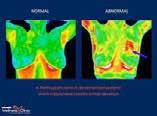




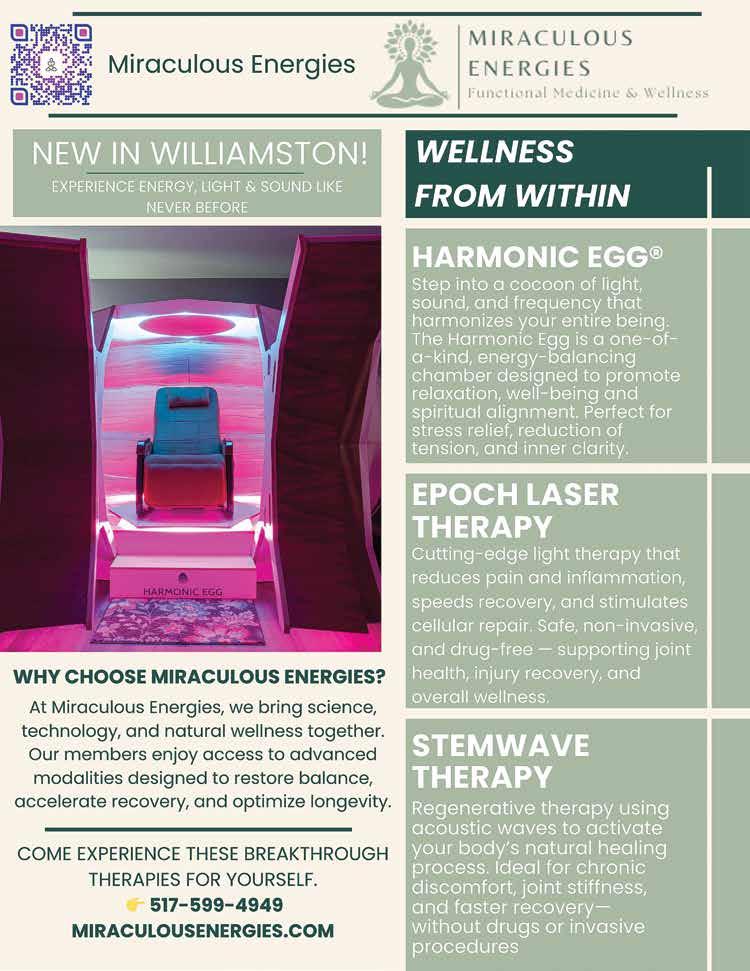
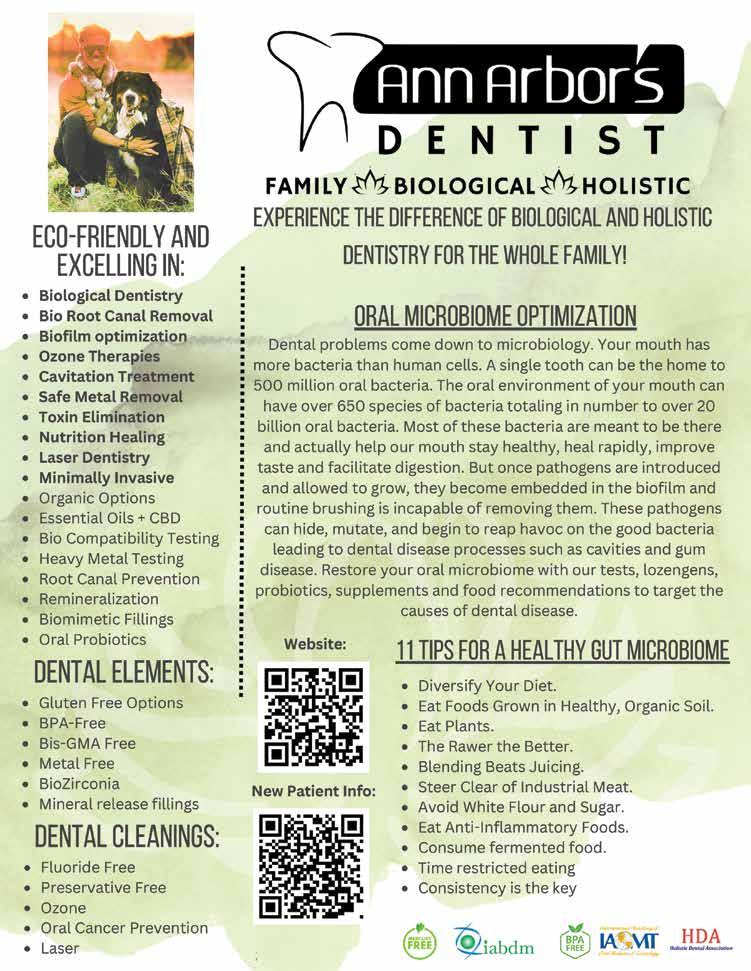


















































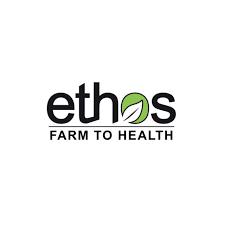



















Make a meaningful impact in your community by becoming the owner of a Natural Awakenings magazine. Empower others with current, valuable insights and resources to enhance their physical, mental, emotional and spiritual well-being.
As a franchise owner, you’ll inspire positive change, provide readers with tools for healthier living and connect local businesses with an audience eager for transformation.
Why Own a Natural Awakenings Magazine?
n Create a Healthier Community: Be the go-to resource for wellness and personal growth in your area.
n Boost Your Income: Take control of your financial future with a proven business model.
n Enjoy a Flexible Lifestyle: Work from home while pursuing a fulfilling, dynamic career.
What We Offer:
n A proven business model with low startup costs.
n Comprehensive training and friendly, ongoing support.
n Flexible work schedule with many work-from-home opportunities.
n Access to a network of like-minded franchise owners.
n Financing Options Available.
Join a thriving network of passionate franchise owners reshaping the future of holistic health and wellness.
Call 239-206-2000 for a FREE evaluation of your community’s potential. Learn more or apply today at: Corp.NaturalAwakenings.com
Add Your Community to Where Natural Awakenings Is Now Publishing:
• Atlanta, GA
• Boston, MA
• Broward County, FL
• Bucks/Montgomery Counties, PA
• Central Florida/Greater Orlando, FL
• Central New Jersey
• Charlotte, NC
• Chicago, IL
• Columbia, SC
• Dallas, TX
• Daytona/Volusia/Flagler Counties, FL
• Detroit/Wayne County, MI
• Fairfield & Southern Litchfield Counties, CT
• Grand Traverse Region/Northern Michigan
• Greater Ann Arbor, MI
• Greater Lansing, MI
• Greater Oakland, Macomb, Livingston, Genesee, MI
• Gulf Coast, Alabama/Mississippi
• Houston, TX
• Jacksonville/St. Augustine, FL

• Lehigh Valley, PA
• Long Island, NY
• Milwaukee, WI
• Monmouth/Ocean Counties, NJ
• Naples/Fort Myers, FL
• New York City, NY
• North Central New Jersey
• North New Jersey
• Northwest Florida
• Palm Beach, FL
• Philadelphia, PA
• Phoenix, AZ
• Rhode Island
• Richmond, VA
• Sarasota, Manatee, Charlotte and DeSoto Counties, FL
• South Central Pennsylvania
• South Jersey, NJ
• Southeast North Carolina
• Space & Treasure Coast, FL
• Tampa, FL
• Tucson, AZ
• Twin Cities, MN
• Westchester/Putnam/Dutchess, NY
• Western Michigan Call for a free evaluation of your community's potential at 239-206-2000. To apply or learn more, visit Corp.NaturalAwakenings.com.
• Lancaster/Berks, PA

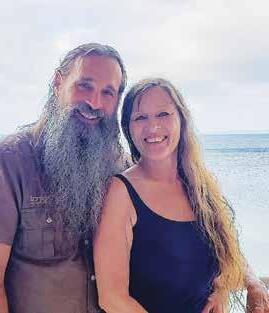
This month we’re turning our attention to one of the most exciting frontiers of health: the brain. For so long, many of us believed that the brain was static—set in its ways after a certain age. But modern science has revealed a much brighter truth: our brains are adaptable, flexible and capable of growth throughout our lives. This gift of neuroplasticity is what makes true Brain Gain possible.
Neuroplasticity means that every new experience—whether learning a skill, practicing mindfulness or even shifting our self-talk—creates fresh neural pathways. Old patterns that no longer serve us can weaken, while healthier habits and perspectives grow stronger. In essence, we each carry a reset button inside us, ready to be pressed whenever we choose to begin again.
I’ve noticed this in my own life. Recently, I caught myself falling into an old pattern of worry. In that moment, I chose to pause, breathe and gently redirect my thoughts. It felt a little like stepping off a familiar trail in the woods to forge a new path. The first steps were awkward,
but with repetition, the new trail became easier to follow. That’s neuroplasticity at work—the brain reshaping itself one choice at a time.
The best part is that these small resets add up. Practicing gratitude, learning something new, moving our bodies or simply focusing on the present moment all fuel brain health. Each act strengthens the mind’s ability to adapt, opening doors to resilience, creativity and joy.
This issue is devoted to exploring these possibilities. We invite you to discover fresh ways to nurture your brain, embrace your own capacity for renewal and experience the empowering truth that it’s never too late for growth.
As always, we are so grateful to you—our readers, advertisers and community partners—for being part of this journey. Month after month, your support allows us to share knowledge and inspiration that help us all live healthier, more connected lives.
Here’s to your Brain Gain—may you press reset often and discover the bright pathways waiting within.
HEALTHY LIVING HEALTHY PLANET
LOCAL CONTACT
734-757-7929
Publisher@HealthyLivingMichigan.com HealthyLivingMichigan.com
P.O. Box 2717, Ann Arbor, MI 48106
Subscriptions are available for $120 (for 12 issues) by emailing the above address.

Natural Awakenings is printed on partially
Publishers John & Trina Voell III
Design & Production John & Trina Voell III
Ad Design Josh Halay
Editors John & Trina Voell III
Proofreader Randy Kambic
Calendar Theresa Archer
Sales & Marketing John & Trina Voell III
Distribution Cindy Heistand City Pulse
Website Design Locable
Website & Social Media Carolyn Coogan SherTech
CEO Kimberly B. Whittle
COO Michael Bevilacqua
CMO Vee Banionis
Sr. VP Operations Brian Stenzler, DC
National Editor Sandra Yeyati
Editor Brooke Goode
Copy Editor Melanie Rankin
Print Production Specialist Kevin Rankin
Design Director Agnes Mazeikaite
Production Flip180
Customer Service Dani Bucad
National Contact 350 Main St, Ste 9B Bedminster, NJ 07921 239-206-2000
© 2025 by Natural Awakenings. All rights reserved. Although some parts of this publication may be reproduced and reprinted, we require that prior permission be obtained in writing. Natural Awakenings is a free publication distributed locally and is supported by our advertisers. Please call to find a location near you or if you would like copies placed at your business. We do not necessarily endorse the views expressed in the articles and advertisements, nor are we responsible for the products and services advertised. Check with a healthcare professional regarding the appropriate use of any treatment.



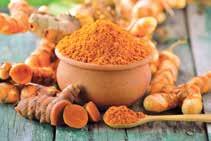
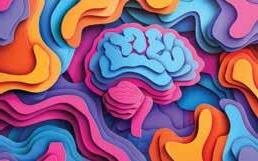

Neurobehavioral Health and Wellness provides a comprehensive and personalized approach to mental health care by blending neuroscience-based psychiatry with holistic, lifestyle-focused therapies. The practice is grounded in the belief that lasting wellness comes from addressing root causes rather than symptoms alone.
Clients receive individualized treatment plans that integrate evidence-based interventions with support for sleep, nutrition, movement, mindfulness and positive psychology. While medications remain an important tool, the practice expands beyond traditional models to include whole-body strategies that empower clients to actively participate in their own healing.
The team at Neurobehavioral Health and Wellness focuses on creating meaningful therapeutic relationships, taking the time to understand each client’s story. This depth of connection allows for more effective care and a stronger path toward personal transformation.
Whether navigating anxiety, depression, trauma or burnout, clients work with professionals that prioritize long-term balance in mind, body and spirit. The goal is not only symptom relief, but a life of clarity, resilience and purpose.
Location: 4127 Okemos Rd., Ste. 4, Okemos. For more info or to make an appointment, call 517-899-2932 or visit NBHealthAndWellness.com.
traditional talk therapy to integrative, evidence-based strategies, helping clients manage anxiety, depression, trauma and more. This flexible model allows therapists to meet people where they are and guide them toward greater resilience, balance and clarity.
Understanding that growth takes time, therapists offer ongoing support that honors each person’s pace. Blooming Minds Therapy is committed to creating a space where transformation feels possible— even in the face of life’s toughest seasons.
Inclusivity is central to the practice’s mission. All are welcome, including individuals of all races, genders, sexual orientations, spiritual beliefs and lifestyle choices. Clients are encouraged to show up fully and authentically, knowing they will be treated with respect and compassion.
At its core, Blooming Minds Therapy helps individuals develop the tools needed to weather life’s storms and bloom into their full potential.
Location: 3496 E. Lake Lansing Rd., East Lansing. For more info or to make an appointment, call 517-862-1615 or visit BloomingMindsTherapy.com.
Embody Natural Health & Nutrition, a naturopathic and clinical nutrition practice based in Lansing, helps individuals take proactive steps toward wellness through natural methods. The practice is rooted in the philosophy that food is medicine and nature holds the key to healing.


Mental health chal lenges don’t come with a one-sizefits-all solution. For many individ uals, healing be gins with feeling understood—and supported—in a safe, affirming en vironment. That’s the foundation of a therapeutic practice in East Lansing where personalized care and long-term growth are the focus.
At Blooming Minds Therapy, licensed professionals offer individualized treatment rooted in the belief that each person’s path to healing is unique. The team uses a variety of approaches, from
Offering general wellness consultations, personalized nutrition support and education in herbal and supplemental therapies, Embody Natural Health & Nutrition provides clients with the tools to improve and maintain their health. Appointments are tailored to each person’s needs, lifestyle and health goals, with an emphasis on prevention and long-term well-being.
The practice also guides clients through customized lifestyle recommendations that support physical, emotional and mental balance. This includes sustainable changes that can be integrated into daily life, helping individuals move toward optimal wellness with clarity and confidence.
Founded on the belief in the body’s innate capacity to heal, Embody Natural Health & Nutrition encourages clients to embody a life of natural wellness. Through compassionate care and practical education, the practice continues to serve the greater Lansing community with a holistic approach to health.
Location: 6500 Centurion Dr., Ste. 270, Lansing. For more information or to make an appointment, call 616-315-1435 or visit EmbodyNatural HealthMI.com.

An Owosso-based wellness center is offering a range of natural health services to the local community with a focus on personalized, root-cause healing. Holistic Beginnings supports individuals through every stage of life, from preconception and birth to elder care, with both in-person and remote options available.
The practice offers naturopathic consultations, custom wellness programs and full-spectrum doula services that provide education and emotional support during pregnancy, birth and postpartum. Bodywork offerings include craniosacral therapy, myofascial release, light healing touch and other holistic modalities aimed at restoring balance and function.
In addition to individualized care, the center provides access to wellness tools and natural products including supplements, homeopathic remedies and non-invasive devices such as the Avacen, Lifewave patches and Iteracare wand. These products are available to clients and the public and are chosen to complement personalized care plans.
Serving the Owosso community since 2019, Holistic Beginnings is committed to helping individuals pursue sustainable, natural wellness through education, hands-on support and compassionate care.
Location: 111 E. Main St., Owosso. For more information or to make an appointment, call 989-472-3856 or visit HolisticBeginningsLLC.com.
For those seeking more than temporary relief from pain and stress, Rassel-Daigneault Holistic Health Center, in Lansing, offers a different path—one that empowers longterm healing from the inside out.

This well-established practice has served the community for over two decades, combining chiropractic care, clinical nutrition and massage therapy to restore balance and promote whole-body wellness. The center is regularly recognized by patients as a top choice for chiropractic services in the region.
Unlike practices that focus only on short-term pain relief,
Rassel-Daigneault Holistic Health Center prioritizes sustainable health outcomes for individuals and families alike. Their team works to realign the spine, nourish the body at the cellular level and release muscular tension—creating a powerful foundation for ongoing wellness.
The center’s integrative approach supports the body’s natural ability to heal and adapt. Whether addressing chronic discomfort, acute injuries or preventive care, services are tailored to the specific needs of each patient.
Staffed by dedicated professionals with decades of experience, the practice believes true health stems from treating the root causes—not just the symptoms. By aligning the nervous system, optimizing nutrition and relieving physical strain, Rassel-Daigneault Holistic Health Center helps patients reclaim vitality and improve quality of life.
Location: 537 N. Clippert St., Lansing. For more info or to make an appointment, call 517-225-4413 or visit LansingChiropracticClinic.com.
Michigan Center for Holistic Medicine provides patients with comprehensive care designed to im prove well-being, pre vent disease and pro mote longevity. The practice emphasizes proactive approaches that help individuals reduce morbidity, increase quality of life and gain the tools needed for sustainable health.

At the heart of the center’s philosophy is the belief that health should be guided by prevention and individualized attention. Each patient is supported through personalized care plans that combine natural medicine with modern therapies. By addressing the whole person instead of isolated symptoms, the center helps patients restore balance and achieve lasting results.
Services include wellness evaluations, integrative therapies and nutrition-focused strategies tailored to specific conditions and overall vitality. The center also offers Wellness IV Nutrient Infusions and Nutrient Injections, giving patients immediate support for issues such as fatigue, migraines, nutrient deficiencies and immune health. These therapies complement the center’s broader commitment to personalized wellness by delivering effective, natural solutions.
The Michigan Center for Holistic Medicine is committed to creating a supportive environment where patients feel heard, cared for and empowered. By combining compassionate guidance with innovative treatments, the center continues to redefine preventive care in Lansing and beyond.
Location: 1909 E. Michigan Ave., Lansing. For more info or to make an appointment, call or text 616-264-6556 or visit MICenterHM.com.
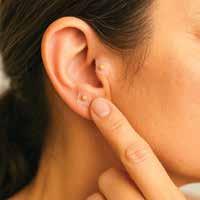
Auricular acupressure uses vaccaria seeds on specific ear points taped in place and periodically rubbed in a circular motion to stim ulate them. A study in the European Journal of Integra tive Medicine investigated whether this type of acupres sure could help improve sex ual function in postmenopausal women.
When the ovaries stop producing hormones like estrogen, mood, sleep and sexual desire may suffer. Low libido, vaginal dryness or pain during sex affects nearly half of postmenopausal women.
Breast milk also contains secretory immunoglobulin A (SIgA), an antibody that blocks harmful bacteria and viruses from attaching to the gut lining, and reduces inflammation in infants. Higher SIgA intake in infancy leads to healthier immune patterns and may provide better protection against allergies and infections. Breast milk also includes living bacteria and other bioactive molecules that contribute to the early seeding of the gut, helping to set the stage for the infant’s future microbiome.
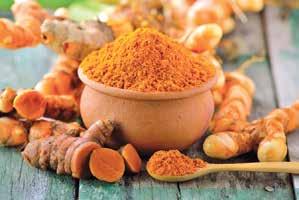
In a controlled, randomized, triple-blind trial with 90 Iranian women, half received ear acupressure and the other half received a placebo treatment for 10 sessions over five weeks. Researchers applied the seeds to ear acupoints linked to sexual function.
Participants completed questionnaires about their sexual function, desire and satisfaction before and after the treatments. The acupressure group reported significantly improved sexual functioning and less distress compared to those in the placebo group, with benefits lasting up to two months after treatment.
A study in The Journal of Allergy and Clinical Immunology highlights the powerful role breastfeeding plays in building a healthy gut microbiome in infants. Although infants cannot digest human milk oligosaccharides, these components nourish beneficial bacteria like Bifidobacterium infantis, a species that reduces inflammation and supports immune development.
Cataracts, a leading cause of blindness, occur when the eye’s clear lens becomes cloudy due to free radical damage. Curcumin, the main compound in turmeric, is a natural antioxidant that can neutralize free radicals and reduce their harm. A systematic review published in the European Journal of Integrative Medicine evaluated whether curcumin could prevent or treat cataracts.
The researchers analyzed 17 animal and/or lab-grown cell studies, demonstrating that curcumin prevented or slowed cataract formation by reducing damage to fats in cells and boosting antioxidant enzymes that protect the eye.
Despite these findings, the researchers noted that human clinical trials are needed to confirm these benefits before curcumin can be recommended as a treatment. Additionally, improving curcumin’s absorption, or bioavailability, is crucial to make it effective as medicine.
The rise of functional medicine, integrative medicine and other forms of holistic health care has increased the demand for specialized laboratory testing. According to the National Institutes of Health, 37 percent of American adults use at least one complementary or integrative health approach.

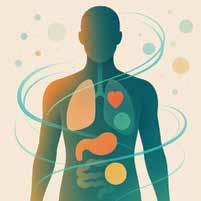
To meet this demand, Labcorp has launched a new specialized testing panel to help providers identify underlying imbalances and support preventive care strategies. This panel includes an advanced cardiometabolic biomarker panel; a comprehensive nutrient panel; a longevity and vitality panel analyzing 71 biomarkers related to aging, inflammation and organ function; men’s and women’s comprehensive hormone panels focused on reproductive and endocrine health; and men’s and women’s whole-body wellness panels with more than 75 biomarkers related to various bodily systems.
The new service enables testing of more than 1,000 biomarkers, providing insights into a patient’s health, from heart function and hormonal balance to micronutrient levels and overall wellness. In addition, Labcorp Whole Health Solutions offers healthcare providers consultation services, digital test ordering, tools to interpret results, and analytics to identify high-risk patients and improve healthcare delivery.

Joint, limb, back, abdominal and bowel pain are the most common types of chronic pain. A study published in The Journal of Pain analyzed treatment data from more than 4.8 million chronic-pain patients with commercial or Medicaid insurance. The researchers found that while the types and frequencies of pain were similar across insurance groups, treatments differed significantly.
Commercially insured patients were more likely to receive restorative and complementary treatments than those with Medicaid. For example, physical therapy was provided to 9 percent of Medicaid-insured patients, compared to 31.1 percent of commercially insured patients. Chiropractic care was accessed by 19.2 percent of Medicaid-insured patients and 38.6 percent of commercially insured patients.
Commercially insured patients also received care more quickly, with wait times from diagnosis to treatment being 50 days shorter for restorative therapy. Medicaid patients were more likely to rely on prescription pain medications, with 81.6 percent having at least one prescription, versus 65.6 percent of commercially insured patients. Commercially insured patients accessed outpatient specialist care more frequently and used multiple non-medication treatments.


When it comes to cuts, scrapes, burns, or surgical wounds, you need a solution that’s both effective and gentle. Doctor Radow’s Povidone-Iodine Ointment is the clear choice over triple antibiotic ointment (TAO):
FEATURE Anti-Fungal
Effective Against MRSA
Post-Surgery Application
Recommended for Diabetics
Long-Term Use (Sustainability)
Emergency Use (Hospitals) Contains Antibiotics



Dressing up for Halloween is a fun way for kids and adults to express themselves, try on new personalities or celebrate their favorite movie characters, but the merriment may come with a hefty environmental price tag. Too many of us buy ready-made, fast-fashion costumes, wear them once and throw them away. Store-bought costumes tend to be made with unsustainable materials such as plastic and polyester, which can take hundreds of years to decompose in landfills, causing harmful microplastics to enter our waterways.
The eco-friendly alternative is to create a costume from items we already have or will use again. That means ditching the plastic, glitter and chemical-laden makeup. It is an opportunity to dial up our creativity and doit-yourself spirit.
• Check the closet, thrift stores and online marketplaces. Outgrown clothes can be


repurposed for a unique boho or witchy look. Layer items in unexpected combinations to make everyday garments take on new personalities. Mix colors. Add a vest. Tie a scarf around the head. Wear multiple hats and mismatched belts.
• Go natural for makeup or effects. Choose eco-friendly paints or natural dyes, including black tea, coffee, turmeric and paprika to color fabrics or decorate handmade, creative costumes. For witchy green skin, slather on a face mask. For rosy cheeks and lips, use a slice of beet to stain the skin. Blend vibrant, shimmery mineral powders for eyes, face or lips. Use eco-friendly face paint kits, such as those available at NaturalEarthPaint.com
• Use household items. Cardboard boxes embellished with foil scraps and reused lids make great robots, astronauts or knights in armor. A white sheet with
cut-out eyes is the quintessential ghost. Blankets and shower curtains can be fashioned into superhero capes.
• Swap or borrow. Get together with family and friends and choose from a pile of costumes from years gone by. Have fun tweaking them and making them new again.
• Handcraft a mask. Gather leaves, flowers, pinecones, feathers, acorns and other natural specimens, as well as paper bags, recycled paper, felt fabric and cardboard. Make a sturdy shape for the base of the mask and cut out an oval for the eyes, then glue the decorative elements. This is a great craft project for kids.
• Garden or Forest Fairy: Wear practice clothing from dance class and layer it with colorful scarves, fake plants, leaves and flowers. Cut wings out of poster board.
• Mother Nature: Wear something green and make a crown from pinecones, sticks or leaves.
• Bat or Owl: Make wings from an old umbrella and use fabric scraps for feathers.



Miraculous Energies is Michigan’s destination for regenerative wellness, biohacking and inner harmony, offering advanced services designed to support whole-person healing. With a strong focus on balance, clarity and non-invasive care, the center provides a tranquil environment where modern innovation meets timeless holistic principles.
At the heart of its mission is the idea that wellness is within. Miraculous Energies helps individuals tap into that innate vitality through cutting-edge energy therapies and compassionate, personalized care.
Among its signature offerings is the Harmonic Egg, a cocoon-like chamber that uses light, sound and vibration to guide the body

into a state of natural recalibration. As clients recline inside the egg-shaped structure, carefully tuned frequencies promote deep relaxation, energy restoration and emotional realignment. This passive yet powerful experience is designed for those seeking to reduce stress, improve mental clarity or recover from emotional or physical strain.
Epoch Laser Therapy is another cornerstone of the center’s approach. This advanced lightbased therapy penetrates deep into tissues to stimulate cellular repair. It supports the body’s healing mechanisms, helping reduce inflammation, ease pain and accelerate recovery from injuries or surgeries. By activating regenerative processes from within, Epoch offers a non-invasive solution for chronic conditions, athletic recovery or general well-being.
Coming soon to Miraculous Energies is StemWave Therapy, an innovative treatment that uses targeted acoustic waves to stimulate healing. This form of extracorporeal shock wave therapy (ESWT) delivers gentle sound pulses into soft tissue, triggering micro-injuries that prompt the body’s natural repair mechanisms. The result is increased circulation, release of growth factors and regeneration of damaged tissue. StemWave may be beneficial for individuals suffering from chronic pain, sports injuries or osteoarthritis.
In addition to these key services, Miraculous Energies offers a range of complementary therapies that include red light therapy, the Energy Enhancement System (EES), massage, bodywork and naturopathic services. Each modality is selected for its ability to support the body’s natural rhythm and restore vitality without invasive procedures.
With a philosophy rooted in empowerment, Miraculous Energies embraces the belief that “your body holds the miracle. We help you find it.” This core message guides the team’s approach to care, as practitioners take time to understand each person’s needs and offer therapies aligned with their path to health. Whether seeking relief from chronic discomfort, a reset for the nervous system or support for emotional well-being, clients find a welcoming space where modern energy medicine is grounded in genuine care.
Location: 2896 N. Williamston Rd., Williamston. For more information or to make an appointment, call 517-599-4949 or visit MiraculousEnergies.com. See ad on inside front cover.
by Hannah Tytus
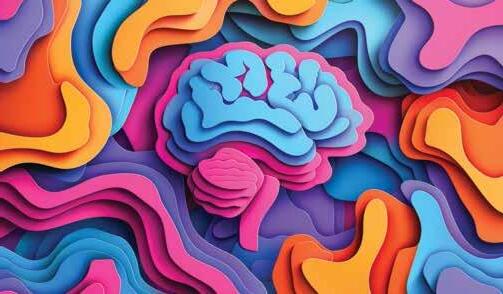
The brain has an amazing ability to rewire itself by strengthening, rerouting or growing new connections in response to learning, experience or injury. This continuous reshaping is known as neuroplasticity. The changes can be positive, such as regaining movement or speech after a stroke or learning a new skill. Sometimes they are neutral, and other times they can be harmful when maladaptive patterns reinforce chronic pain or anxiety. Fortunately, the brain can grow and adapt at any age, and there are many ways to help it thrive. Nourishing foods, mindful movement, meditation, social connection, clean air and restful sleep are everyday choices that can nurture the brain in powerful ways.
Across the Lifespan
It has long been believed that children’s brains
are more malleable as they grow, and that once they reach adulthood, the brain stops evolving. But new research suggests that this may not be the full story. While the brains of developing children are certainly very adaptable, the adult brain is far from fixed.
A variety of influences, including stress, hormones, neurotransmitters, growth factors, medications, environmental stimulation, learning and aging, can reshape how brain cells are built and function. These factors may trigger changes in the size or structure of brain regions, shift the brain’s chemical makeup, alter the shape of individual neurons and even rewire networks of connections, sparking the growth of new neurons in a process called neurogenesis.
Scientists have long known that injuries, chronic stress and the natural process of
aging can take a toll on the brain. Yet, new discoveries in neuroscience and integrative medicine point to the remarkable potential for repair and renewal at every phase of life.
“Nutrition is the foundation of everything in health. You can’t build anything in the body without good food,” says Dr. Kat Toups, a functional medicine psychiatrist, researcher and author of Dementia Demystified: The Definitive Guide to Resurrecting Your Brain, Reversing Cognitive Decline and Regaining Your Memory. Contrary to decades of marketing campaigns for low-fat and fat-free diets, Toups explains, healthy fats are essential for brain health. The spongy white and grey matter of the brain, where all the thinking and messaging happens, is made primarily of fat.
Found in fatty fish such as salmon, sardines and mackerel, as well as in walnuts and fish oil supplements, omega-3 fatty acids are some of the healthiest fats, increasing blood flow in the brain and nourishing its physical structures to help improve learning, memory and cognitive well-being.
“The most validated ways to support neuroplasticity are exercise and meditation— and both are free,” says Toups. Exercise is well-known to protect the brain and boost thinking skills. One way it may do this is by supporting the growth of new neurons and strengthening connections within the hippocampus, an area in the brain involved in the formation of fresh memories and the recall of past experiences. A 2017 study published in Experimental Gerontology found that regular exercise significantly increased hippocampus volume, while nonactive participants showed a shrinking hippocampus.
In addition to strength and cardio training, exercise that incorporates mindful and creative components may enrich the benefits. Engaging the body and mind at the same time can strengthen neural networks
and support long-term cognitive function. Long walks, yoga classes or playful sessions with the kids or grandchildren are excellent ways to support the link between body and brain. Studies show that tai chi, a mindful movement practice, may be even more effective than regular exercise in protecting cognitive function because it increases brain activation in regions associated with motor function and focus, and is accessible to those with mobility limitations.
A regular mindfulness practice supports neuroplasticity, making it easier to regulate emotions and handle stress. A 2024 review found that regular meditation can physically reshape the brain, strengthening areas tied to focus, emotional control and self-awareness. One reason for this is meditation’s effect on a protein called brain-derived neurotrophic factor (BDNF). This molecule acts like fertilizer for brain cells, helping them grow, form new connections and remain healthy. Meditation increases BDNF, and higher levels of BDNF are linked not only to sharper learning and memory, but also to longer lasting brain health.
Additional research has demonstrated that even a short daily meditation session can increase gray matter density in regions tied to learning, memory and emotional regulation. Over time, these changes help reduce stress reactivity and support long-term resilience. Even if formal seated meditation is not
feasible, simple mindful presence can help. “I try to tell people to find small moments to come into their body, come into the moment and be present,” Toups advises. “You can do that by washing the dishes. You don’t need to sit in lotus position and chant for an hour.”
“Every time you learn something new or do a novel task, you are promoting neuroplasticity,” explains Toups. Learning new skills, from juggling to speaking a new language, produces measurable changes in brain structure, particularly in brain matter volume. These changes can occur in both early-learning phases and long-term practice, underscoring the brain’s capacity for adaptation throughout life.
Making music and dancing can strengthen connections in the brain; even the act of listening to music has been shown to enhance neural plasticity and cognitive flexibility. Toups recommends rocking out to a favorite song in the kitchen and choreographing a few dance moves.
Rapid eye movement (REM), a stage of sleep marked by increased brain activity and vivid dreaming, plays an important role in neuroplasticity. During REM, the brain actively prunes unhelpful neural connections and reinforces others, supporting brain development, the learning of new skills and memory improvement.
To support consistent REM sleep, aim for seven to nine hours of shuteye and try to maintain a consistent bedtime and wake time. A good night’s rest after learning a new skill or information can help that lesson integrate into the brain, supporting behavioral change.
Keeping the air in the home clean is important for overall brain health. Research suggests that mold toxicity may be a risk factor for developing Alzheimer’s disease, after researchers discovered traces of fungi inside the central nervous system of many Alzheimer’s patients—an infection that was absent in healthy individuals. Mold toxicity in the home can elicit an immune response and harm the brain. For example, a 2020 study found that black mold inhalation can cause inflammation in the hippocampus and reduce neurogenesis, the growth of new brain cells.
Practicing clean air habits can help assuage the risks of mold exposure at home. These include investing in an air purifier, ventilating regularly by opening windows, using exhaust fans and maintaining household ducts. Mold concerns can be investigated with a simple at-home testing kit, followed by professional testing and remediation, if needed.
“Photobiomodulation is a powerful way to create neuroplasticity, both quickly and over the long term,” says Dr. Lew Lim, founder of

the Vielight photobiomodulation (PBM) device, which has been studied in collaboration with universities and medical institutions, including the University of Toronto, Harvard Medical School and Mount Sinai Hospital.
PBM, also called light therapy, uses gentle red or near-infrared light to stimulate brain cells, boost the energy-producing parts of cells known as mitochondria, improve blood flow and calm inflammation. “When we activate the mitochondria with PBM, the mitochondria actually release growth factors, which support growth of new cells in the brain,” Lim explains.
According to Lim, PBM may help the brain protect and repair its neurons, encourage the growth of new connections and support the clearing of harmful waste proteins linked to cognitive decline. He asserts that certain light pulse frequencies, such as 40 hertz, may also help tune brainwave patterns that are important for memory and learning. While most research so far has been in small human studies or animal models, the results suggest that regular PBM could strengthen the brain’s natural ability to adapt and rewire itself. Some people use PBM as part of a daily routine to keep their minds sharp, while others use it to heal from more serious brain injuries.
Finding Community Research shows that staying connected to others offers powerful protection for the brain. Older adults that feel lonely or spend long stretches without social contact face about a 50 percent higher risk of developing dementia, including Alzheimer’s disease, even when other health factors are taken into account. One long-term study found that memory and thinking skills declined 20 percent faster in those that reported feeling lonely.
Being socially active can help guard the brain against decline. For 25 years, the Northwestern University SuperAging Program has studied people in their 80s and beyond with nimble minds that work as well as people decades younger. Brain scans show that these study participants called SuperAgers do not exhibit the usual thinning of the brain’s outer layer normally seen with age, and one key area involved in attention and decision-making is thicker than even in middle-aged adults.
Under the microscope, SuperAger brain cells are larger, better connected and show fewer signs of Alzheimer’s damage or inflammation. These resilient individuals tend to be very social, valuing close relationships and staying engaged with others—habits

that may work hand-in-hand with their unusually healthy brain structures to help protect thinking skills late in life.
Even a weekly coffee with a friend or joining a class can be powerful brain fuel. People with rich social lives, including those that regularly share time with friends, family and communities, tend to keep their minds sharper for longer.
The brain is never truly fixed. It is a living, adapting system that can grow stronger, sharper and more resilient at any age, and we can guide those changes. Whether through movement, nutrition, light therapy, meditation or meaningful connection, every choice we make can help shape and rewire the mind for the better. The science is clear: it is never too late to nurture the brain’s potential. Embrace neuroplasticity as a lifelong journey and let each new day be an opportunity to learn, adapt and thrive.
Hannah Tytus is an integrative health coach, researcher and former writer at the National Institutes of Health. She also hosts “Root Shock”, a podcast exploring how cultural and systemic forces shape our understanding of health.

by Marlaina Donato

Wdelightful blush of an apple lies an undeniable wistfulness. And although summer must surrender to autumn, each falling leaf signals an opportunity to let go of a burden we’ve outgrown—a home, a relationship, a dream or a particular version of ourselves.
No matter which side of a goodbye we happen to be on, leaving can be painful. Just as the green meadow goes to seed, so does what we hold precious, but a spark of life remains in each fading blade of grass. Endings can also be blessings, even if it takes months or years before their gifts become known.
Each chapter of the year offers its own delights and wisdom, but it is our human tendency to clutch each hour for as long as possible. We can miss a harvest of joys when we only wish to taste the fruits of another season. For the ancient Celtic people, the holy time of Samhain marked the end of the harvest and the start of a new year. It was deemed a mystical time when the veil between the dead and the living grew thin, as
Perhaps this year we can grieve the bright transience of summer while gathering our spiritual stores. Perhaps we can relish autumn’s sweetness despite the dance of decay, inviting a new chapter, a new mindset, as nature takes back its own.
Some rites of passage for inspiration:
• Gather a small handful of sunflower or pumpkin seeds. Take each seed in hand and name something that has been lost or relinquished. Place them beneath a tree or bury them underground, inviting a new year of blessings.
• Taking inspiration from the Celts, host a Samhain celebration on Halloween night commemorating the end of summer and the beginning of winter while setting a plate and chair in honor of a loved one that has passed.
Marlaina Donato is an author, painter and composer. Connect at WildflowersAndWoodSmoke.com.

We offer the holistic community a nature-oriented meeting space for workshops, meetings, counseling, yoga, youth groups, and family gatherings. Main room accommodates 100 pre-Covid, with two smaller classrooms and kitchen facilities. Hiking trails. Weekend rates range from $200-$400, additional for extensive grounds use, camping. Book your next gathering at https://MFCenter.org/rent
“We need to preserve a few places, a few samples of primeval country so that when the pace gets too fast we can look at it, think about it, contemplate it, and somehow restore equanimity to our souls.”



– Sigurd Olson
7748 Clark Lake Road, Chelsea, MI 48118 (734) 475-1892
https://MFCenter.org/rent
by Sandra Yeyati
Dr. Frederick (Ted) Carrick is recognized as the founder of functional neurology, with nearly five decades of research and clinical practice. He established the Carrick Institute for Graduate Studies, offering more than 100 courses and a master’s degree in clinical neuroscience, with a global presence in 13 countries.
With about 100 peer-reviewed, published studies to his credit, Carrick is a senior research fellow at the Centre for Mental Health Research in association with the University of Cambridge, in the UK. He is a full professor of neurology at the University of Central Florida College of Medicine and an adjunct professor at the MGH Institute of Health Professions, in Boston.
His work has been featured in print and television, including PBS and ABC News Nightline documentaries. Carrick holds a doctor of chiropractic degree from Canadian Memorial Chiropractic College, a Ph.D. in education from Walden University and a master of science in health professions education from both the Harvard Macy Institute and MGH Institute of Health Professions. He remains dedicated to patient care, offering in-person and virtual consultations worldwide.
What is functional neurology?
It is an evidence-based, multi-disciplinary approach that enhances human function through the nervous system, regardless of diseases or disorders. My rehabilitation
protocols focus on movement of the head, neck, trunk, extremities and eyes to activate different areas of the nervous system and restore function. These protocols are applied only after a comprehensive neurological examination and testing.
How does this treatment work?
Intentionally moving your right arm is a consequence of the interaction of your brain, spinal cord, peripheral nerves,

muscles and joints. When you move your arm, muscle and joint receptors provide feedback to the brain, while the brain sends motor commands in a feedforward mechanism. The brain also sends out what we call efferent copies of that motor command to other areas of the body, such as the core muscles or the back, to steady yourself so that the lever forces of the arm don’t hurt your back.
Functional neurologists work to increase muscle activity when there is weakness and to reduce muscle activation when it is excessive, as in seizures, epilepsy, dystonia and movement disorders. They also treat neurodegenerative syndromes, memory problems, concussions and neurological issues related to digestion.
What tactics do you employ to improve function?
The Carrick Institute is renowned for therapies that enhance the performance of professional athletes and Olympians, not just in injury recovery, but also in functional improvement. For elite runners, we boost race speed with tailored eye exercises developed over four decades, including fast and slow eye movements in different directions, focusing on individual nervous system needs. Using
this technology, we can increase the speed of swimmers, improve the agility of skiers, increase the number of baskets a person can make and the list goes on.
Beyond athletes, our methods can help the average person walk better and safer by addressing falls, a leading cause of accidental death. We’ve developed movement strategies to enhance balance and stance using advanced tools to measure various factors. For instance, in Parkinson’s patients, we address postural misalignment by improving visual feedback. Our expertise in balance, gait and running parameters is well-established, with extensive published research.
What other treatments do you employ besides eye exercises?
Eye and head movements are central to what we do, but they are usually not done in isolation of other things. For a balance exercise, we might use a pole like a tightrope walker’s. We adjust arm swing ratios, foot placement and hip rotation. Additionally, we employ electrical stimulation and physical therapy, which are beneficial for stroke survivors.
Are positive results long-lasting?
Our goal is to make patients autonomous so they don’t have to come back to see us.
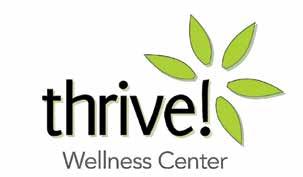

We give patients lifestyle changes, exercises and regimens that they can do on their own. Those who adhere to these strategies generally do well long-term. However, many people stop exercising and start getting symptoms again, so they have to come back in.
Who should consult with a specialist in functional neurology?
Conditions that have symptoms typically bring a patient to the functional neurologist. If severe migraines disrupt your daily tasks, if you struggle with basic activities like using a knife and fork to cut your food, or if your head injury affects your vision or memory, consult a functional neurologist. However, many neurological conditions do not have recognizable symptoms but still need to be addressed. I think everyone should visit a functional neurologist annually to ensure optimal functioning. Many discover imbalances, such as uneven hand movement or poor memory.
We treat all ages. Many younger patients are suffering from accidents like motorcycle falls or sports injuries, while older patients face neurodegenerative issues. We also assist kids with learning and developmental challenges.
Sandra Yeyati is the national editor of Natural Awakenings.

by Maya Whitman

The U.S. Centers for Disease Control and Prevention reports that about one in 10 adults aged 45 and older experience worsening memory loss or cognitive decline, a precursor to dementia. A 2022 study in JAMA Neurology indicates that 22 percent of adults over age 65 experience mild cognitive impairment. Our dietary choices significantly impact brain longevity, and what we avoid is equally important.
The late pioneering researcher Dr. Martha Clare Morris developed the MIND Diet, which merges the Mediterranean and DASH (dietary approaches to stop hypertension) diets to enhance cognitive function with plenty of delicious versatility. A 2015 study published in Alzheimer’s & Dementia found that strict adherence to the
MIND Diet can reduce Alzheimer’s risk by 53 percent, while moderate adherence can lower it by 35 percent.
The MIND Diet is a stress-free, lifelong plan with bountiful menu options, including fish, lean poultry, vegetables, nuts, berries, whole grains, legumes and high-quality olive oil. It accommodates gluten-free and plant-based preferences. With satiating breakfast options like Greek yogurt or scrambled eggs, spicy chili for lunch and fun dinner burrito bowls, this diet is flexible and beginner-friendly, allowing for moderate consumption of pasta, potatoes and bread, with a focus on whole-grain, complex carbohydrates over refined ones. It also recommends oven roasting instead of high-heat frying.
“You can never be too young to embrace brain-healthy dietary strategies in support of longevity. Early adoption of brainhealthy eating habits may also enhance cognitive reserve, strengthening the brain’s resilience to neuropathological damage over time,” says neuroscientist Kristen Willeumier, founder and CEO of the Willeumier Center for Advanced Research in Neurotrauma & Brain Rehabilitation, in California.
Embracing variety is important. “I like to have people think of brain-healthy food groups, not superfoods,” states Annie Fenn, M.D., founder of the Brain Health Kitchen and author of The Brain Health Kitchen: Preventing Alzheimer’s Through Food. Fenn
notes that women are more likely to develop Alzheimer’s than men “for reasons that have nothing to do with living longer. Alzheimer’s can start in the brain up to 30 years before the first symptoms. It’s never too early or too late. Data shows that switching to a brain-healthy diet can have benefits even in one’s 70s.”
The Link Neuroscience Institute, in California, recommends eating more colorful berries, fatty fish such as sardines, dark leafy greens, nuts and seeds, and a moderate amount of high-quality dark chocolate to protect the brain from oxidative stress, which can lead to conditions like Alzheimer’s and Parkinson’s diseases, as well as mood disorders, including long-term depression. They also advise against consuming processed and fried foods, sugar, alcohol and sodium.
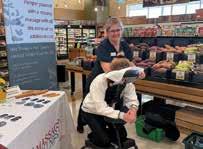

According to Willeumier, even a modest reduction in the intake of processed foods, including packaged products, sweetened cereals, deli meats and sugary beverages, can have a positive impact on brain health. She recommends the complete elimination of alcoholic beverages. “Neuroimaging studies, including the Whitehall II Study, which followed 550 participants over a 30year period tracking alcohol intake and cognitive performance, suggest that there is no protective effect of alcohol on the brain, even from light drinking. Eliminate alcohol for the preservation of your long-term brain health.”
Certain foods accelerate brain aging, and Fenn recommends limiting or eliminating fast and fried foods, sugar, artificially sweetened drinks, ultra-processed products and


foods that are excessively high in saturated fat like butter and some cheeses. Certain cooking techniques are also problematic. “Frying, searing and grilling directly over high heat creates inflammatory particles called advanced glycation end products, or AGEs,” explains Fenn. “Think low-and-slow when you cook—low heat, slow cooking, braising, poaching, steaming and indirect grilling.”
Willeumier notes that these healthy eating habits can have an immediate effect on brain function by influencing neurotransmitter production, stabilizing blood sugar levels, reducing inflammation and improving cerebral blood flow, all of which can also help us to live longer, maintain our focus and thinking skills, and feel happier.
Maya Whitman is a frequent writer for Natural Awakenings.






YIELD: 3 SERVINGS
1 cup old-fashioned, rolled oats
1 medium ripe banana
2 large eggs
½ cup cottage cheese (nonfat or whole), plus more for serving, optional
¼ cup water
½ cup almond, buckwheat, hazelnut or quinoa flour
¼ cup protein powder, optional
¼ cup hemp seeds, plus more for sprinkling
1 tsp baking powder
½ tsp ground cinnamon
¼ tsp kosher salt
¾ cup frozen wild blueberries (about 1 Tbsp per pancake)
Yogurt to taste, optional
Fresh berries or mashed frozen berries for toppings, optional
Pure maple syrup, warmed, optional
Extra virgin olive oil, drizzled
Place the oats in a blender until ground into a coarse flour with a texture like almond meal. Add the banana, eggs, cottage cheese and ¼ cup water and blend on high until smooth and no pieces of banana remain. Add the flour, protein powder, hemp seeds, baking powder, cinnamon and salt, in that order. Blend just until combined. Set aside while toppings are prepared.
Check the batter. If it is too thick to pour, add water 1 teaspoon at a time until it has a pourable consistency but not too thin—these should be thick, hearty pancakes.
Warm a large, nonstick skillet over medium-high heat with a drizzle of olive oil, swirling to distribute evenly. Measure ¼ cup of batter for each pancake, about three per large skillet. Scatter 1 heaping tablespoon of blueberries over each pancake, pressing slightly so they adhere. Cook until the underside is crispy and brown and the center is set, about 3 to 4 minutes. Using a rigid spatula, carefully flip the pancake and cook until golden brown on the other side and the center is dry, another 3 to 4 minutes.
Serve right away or transfer to a plate and place in the oven to keep warm. Repeat, using the remaining batter and berries. Serve hot, dollop with yogurt, a sprinkle of hemp seeds and more berries on top. Drizzle with maple syrup.
Store leftover pancake batter in an airtight container in the refrigerator for up to four days. The batter will thicken as it sits, so thin with 1 teaspoon of water at a time.
Courtesy Annie Fenn
Recipe courtesy of Annie Fenn.

YIELD: 2 SERVINGS
2 wild-caught salmon fillets
1 lb fresh asparagus, washed
2 Roma tomatoes
1 avocado, sliced
1 head butter lettuce, divided in half
½ lemon, sliced in two
Preheat the oven to 400° F.
1 to 2 cloves of fresh garlic, finely chopped
1 Tbsp fresh or dried thyme leaves
Sprinkle of oregano
Himalayan salt, to taste
Black pepper, to taste
Extra virgin olive oil, drizzled


Place salmon in a baking dish and squeeze an even amount of lemon juice on each fillet. Season filets evenly with chopped garlic and thyme leaves. Add Himalayan salt and black pepper to taste. Drizzle with olive oil.
Bake salmon in the oven for 25 minutes.
Place asparagus on a baking sheet and drizzle about a tablespoon of olive oil on top. Add Himalayan sea salt and black pepper to taste. Roast the asparagus in the oven for 15 minutes.
Serve salmon on a bed of butter lettuce with chopped Roma tomatoes, avocado and roasted asparagus on the side.
Recipe courtesy of Dr. Kristen Willeumier.




by Marlaina Donato
White-knuckling our way through life can be exhausting, but more than that, chronic strain can negatively impact brain function and even alter its physical structure. Continually recurring stressors can lead to impaired memory, emotional dysregulation, anxiety disorders and depression. When the nervous system gets stuck on overdrive, the body delays a variety of critical functions, including immune response and tissue repair, in order to deal with perceived emergencies.
Over time, the amygdala, an area within our brain that is responsible for processing fear and alerting us to danger, can become enlarged and hyperreactive, hardwiring us to be in a constant fight-or-flight mode. Prolonged stress of this nature can lead to excessive accumulation of cortisol in the brain, setting the stage for conditions like inflammatory bowel disease.
Gently reprogramming an overstimulated nervous system can initiate and improve cellular repair, nutrient absorption, sounder sleep and more tranquil moods. Restoration of the body’s natural capacity for calm is possible through noninvasive, painless approaches such as sound healing, craniosacral therapy and certain forms of acupressure.
“When we are under stress all the time, the autonomic nervous system gets out of balance, and the body cannot heal itself as it is intended to do,” explains Gail Lynn, the author of Unlocking the Ancient Secrets to Healing and inventor of the Harmonic Egg, which uses light, color and sound to provide an immersive relaxation experience.
In 2007, she faced a cardiovascular health crisis at age 37, which she attributes to three successive challenging careers and a stressful personal life over the span of many years. Lynn explored a number of alternative solutions, and with full-body sound-and-light sessions experienced a profound shift in her health and well-being. She attests
that resetting her nervous system enabled her body to heal itself, making her life “100 percent better”.
Modern sound therapy has ancient roots in cultures worldwide. The use of tuning forks, therapeutic gongs, singing bowls, mantras, percussive hand instruments and binaural beats has been shown to synchronize brainwaves in a process called brainwave entrainment, resulting in a lowered stress response. Harvard Health notes
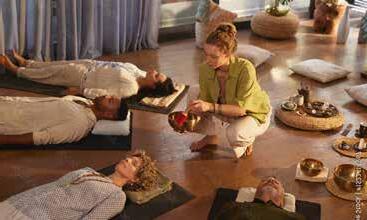
that soothing tones can lower elevated blood pressure and promote healthier heart and respiratory rates, alleviating burden on the autonomic nervous system.
Another way to switch off a state of perpetual survival mode is to restore balance to the vagus nerve, which connects the brain to the heart, lungs, kidneys, liver and most of the digestive tract. “Seventy percent of the traffic on the vagus nerve goes from the organs to the brain. Only 30 percent of the traffic goes from the brain to the organs, so it is much more a situation of the gut controlling the brain,” explains Tim Hutton, a craniosacral therapist and Upledger Institute instructor in Bellingham, Washington. Hutton underscores that the body can recuperate once it is able to shift out of fight-flight-orfreeze mode and into the ventral vagal state of rest-and-digest.

Developed by John E. Upledger in the 1970s, craniosacral therapy (CST) is a gentle bodywork modality that seeks to restore the natural functioning of the membranes and fluids surrounding the spinal cord and brain. “There is a subtle, rhythmic motion of the tissue that we call the craniosacral rhythm that is easily disrupted. Any tension or compromise in the body’s ability to function will adversely affect the craniosacral rhythm,” says Hutton. “As a therapist, I support the client’s healing process and let their body lead.” CST releases tension in the craniosacral system, shifting the body to the rest-and-digest mode and enhancing vagus nerve function.
A 2020 study published in Complementary Therapies in Medicine of patients with complex traumas, including post-traumatic stress disorder, reported improvements in quality of life after receiving a combination of CST and psychotherapy. A 2023 randomized clinical trial published in Behavioral Sciences involving 57 healthy firefighting cadets showed a reduction of the stress hormone cortisol in participants that received CST sessions for five consecutive weeks.

Stress and anxiety contribute to insomnia, which can cause even more stress. With roots in Traditional Chinese Medicine, auricular therapy involves the stimulation of 120 acupoints in the ear that correspond to the nervous system and certain other parts of the body. The therapy is believed to positively influence neurotransmitter activity, which facilitates the communication between brain cells, while also enhancing neuroplasticity, the brain’s ability to reorganize and adapt by forming new neural pathways.
A 2023 systematic meta-analysis published in Frontiers in Sleep reported that auricular acupressure can be beneficial for insomnia. Ear seeds, a type of ear acupressure without needles, have also shown promise for anxiety and insomnia.
By applying any one or a combination of these therapies, it is possible to experience more balance and calm. If a particular modality does not bring about the desired stress relief, persist with another. “There is always hope,” says Hutton. “Most often, miracles are incremental.”
“A lot of people are wary about hypnosis, they think it’s kooky or witchcrafty, but really it is a very comfortable relaxation...and it onlyhelps you do what youwant to do.” says onesatisfied client.
With a 95% Success rate, Ariana Joy Arlen guarantees smoke cessation in just ONE visit – and unlike edications, there are no unwanted side-effects!
Make any positive change you’ve been wanting to make! Ariana Joy Arlen is a certified hypnotherapist, & creator of ‘Free at Last!
Journey’
what are you waiting for? It’s never too late to begin a ‘Joyful Journey.’
Marlaina Donato is an author, painter and composer. Connect at WildflowersAndWoodSmoke.com.






to support

by Ruth Roberts, DVM, CVA, CVH, CVFT, NAN

Advancements in technology are improving the daily lives of pets and their people. From collars equipped with global positioning systems (GPS) to wearable devices that monitor behavior and detect potential health shifts, these innovations are transforming the way we interact with our animal companions. Before embracing smart devices, however, pet parents should be informed about their potential benefits and limitations.
GPS trackers attached to pet collars are gaining popularity, especially for active or escape-prone animals. Using satellite or cellular signals to continuously monitor a pet’s location, these devices help pet owners quickly locate stray companions.
A 2021 study conducted at the University of Veterinary Medicine, Vienna, revealed
that the radiation exposure experienced by pets from GPS and Bluetooth devices is well below international safety standards, implying that adverse health effects are unlikely. The study also noted that adjusting how often a tracking device sends location data can influence a pet’s exposure to radiofrequency electromagnetic fields (RFEMF). For example, some devices transmit only every few hours when the pet is resting, but switch to every minute or every few seconds during periods of high activity. To further minimize RF-EMF exposure, the researchers recommend using a harness-mounted tracking device instead of a collar-mounted one.
In addition to GPS technology, microchips can serve as a reliable backup identification method. A microchip is a permanent form of identification implanted under the pet’s skin, usually between the shoulder blades.
It cannot track a pet’s real-time location but stores a unique number linked to the owner’s contact details. If scanned at a clinic or shelter, it can help reunite lost pets with their owners.
Although they do not replace veterinary care, health trackers can support early intervention and informed veterinary conversations. Certain devices monitor behaviors such as scratching, licking, shaking, sleeping and resting. They compare this data to the pet’s usual habits or population averages. Sudden changes may indicate discomfort and prompt further attention. Data from health trackers helps veterinarians and pet parents confirm concerns about allergies, anxiety or appetite changes.
These devices can be useful in busy or multipet homes. Owners may miss subtle changes, whereas trackers are capable of detecting them. The historical data can help veterinarians see patterns over time. Still, the data needs context, as not every change signals an illness. Environmental shifts, routine disruptions or the natural progression of aging can also impact an animal’s behavior. Trackers flag what is different, but they do not explain why.
While pet health trackers can provide valuable behavioral insights, metabolic estimates such as calorie burn should be interpreted with caution. A 2023 study published by AVMA Publications evaluated the accuracy of a popular dog activity monitor. The study of 23 healthy dogs over a 28-day period found that the monitor failed to accurately measure the dogs’ calorie expenditures. Notably, the device overestimated the calorie needs of most of the dogs, even when their body weights remained stable
throughout the study period. While these devices can be useful for tracking trends and identifying changes, pet owners should exercise caution when using them to make dietary decisions.
Feeding routines are crucial components of many pet health plans, particularly for animals experiencing food sensitivities, chronic illness or weight concerns. Smart feeders can automate portion control, meal timing and consistency. For veterinarian-guided weight-loss plans that rely on controlled food and calories intake, it is imperative to select devices that can deliver multiple daily feedings in precise, small portions. Most smart feeders work well for dry kibble. Some models feature sealed trays, microchip-activated lids or cooling compartments, making them suitable for wet or home-cooked meals.
Smart feeders can help maintain consistency and promote healthy habits but should not be considered standalone solutions for diet-related health concerns. They are most effective when integrated into a clinical feeding plan under the guidance of a veterinarian. This approach ensures that calorie needs are met, a healthy weight is maintained and potential dietary risks are minimized.
Smart pet technology can provide valuable insights into a pet’s daily habits, but it is essential to understand its limitations. These devices are not diagnostic tools. They cannot test for allergens, run lab work or evaluate physical symptoms. Their primary function is to serve as early warning systems, flagging subtle changes that pet parents might otherwise miss. It is important to refrain from solely relying on technology. Misinterpreting data can lead to unnecessary worry or delayed medical attention. Real observation and professional input remain indispensable.
Ruth Roberts is an integrative veterinarian and a holistic health coach for pets, as well as the creator of The Original CrockPet Diet. Learn more at DrRuthRoberts.com.







SATURDAY, OCTOBER 4
Fall Native Plant Sale – 9am-1pm. Includes Michigan native sedges, grasses, wildflowers and ferns. All proceeds benefit HNC. The native plants are grown locally at Designs by Nature in Laingsburg and Michigan Woodland Wildflowers & Ferns in Haslett. Harris Nature Center, 3998 Van Atta Rd, Okemos. 517-349-3866. Tinyurl. com/bdeuvd49.
Victorian Ghost Walk – 6-9pm. Join us for a bone-chilling night of otherworldly delights touring the haunted basements and spooky upper stories of Williamston’s most iconic Victorian architecture. Visit the Macabre Art Show at Keller’s Plaza from 3-9pm. Keller’s Plaza, 100 E Grand River Ave, Williamston. Tinyurl.com/33hrr5nf.
THURSDAY, OCTOBER 16
Free Webinar: Next Steps for Nature – 7-8pm. With Doug Tallamy. AnnArbor. WildOnes.org.
FRIDAY, OCTOBER 17
25th Annual Wise Traditions Conference – Oct 17-19. Sponsored by the Weston A. Price Foundation. Includes 40 speakers and 70 exhibits plus farmto-table meals. Reasonable rates. which include conference meals and special 1-, 2- or 3-day passes, plus reduced rates for 20 and younger. Salt Lake City, Utah. Info & register: WiseTraditions.org.
SATURDAY, OCTOBER 18
Wine in the Woods – 7-9pm. Bring your favorite beverage and enjoy a guided walk through the woods with a naturalist at the Harris Nature Center. After the walk, “unwine” by the campfire and enjoy gourmet smores. 21+. Harris Nature Center, 3998 Van Atta Rd, Okemos. Registration required: Tinyurl.com/bdcrt7xu.
SUNDAY, OCTOBER 19
Forest Bathing – 10:30am. Enjoy the opportunity to be in a forested environment, to slow down, and to connect to our natural surroundings with intention. Michigan State University Sanford Natural Area, East Lansing. WildOnesLansing.weebly.com.
THURSDAY, OCTOBER 23
Bird Song and Music Composers Webinar – 6-7pm. Join local music teacher/ composer Andy Jarema for a trip through hundreds of years of musical history. Register: DetroitBirdAlliance.org.
FRIDAY, NOVEMBER 7
Activating Women’s Retreat – Nov 7-9. Activate your heart energy to Spirit and God. In this group healing retreat, you will experience tandem energy work, aligning organs, balancing chakras, grounding, past life regressions, rife frequencies and more. $799/Fri & Sat; $299/Sun. PARC, 650 Church St, Plymouth. 734-934-7271. More info: UniversalEnergyWellness.com.

Esoteric Energy Healing Sessions – With Bonnie K. Dysinger, certified practitioner of Esoteric Healing. More info: 517-281-1706 or BonnieDysinger.com.
Free Online Programs – Practical Buddhism, Healing and Compassion Meditation, Group Practice, White Tara Guided Healing Meditation, Sunday Talks. Jewel Heart Tibetan Buddhist Learning Center: JewelHeart.org.
Sound Bath Meditations for One – With Betty Gauthier, owner of Gentle Earth Sound Therapy and Holistic Wellness. $75/60 mins, $110/90 mins. To book a session: GentleEarthSoundTherapy.org.
HEAL Club Membership – 6am-10pm. Gives you daily access to the HEAL lounge where you can personalize your experience using innovative, state-of-the-art equipment designed to help you relax, repair, recover and recharge. Receive exceptional savings on all of LiveWELL’s class offerings, workshops and 10% off individual healing services. Live Well Healing Community, 2820 Covington Crt, Lansing. 517-657-7131. LiveWellHeal.com.
Holistic Health Consultation – 9am-7pm. Online or phone consultation consultations last about 1 hr and are provided by Certified Xolar Vibronics Holistic Educator and Life Coach Ikaro Phoenix. $150. For appt: LivingWisdomCoaching.earth.
Naturally Purifying and Supercharging Your Body Podcast – 7-7:45pm. Matthew Hazen is the owner of Human Consciousness Support, a company that produces a unique nutraceutical product called MasterPeace. Free. BuzzSprout. com/1206776/14236700.
Science Day Camps – 9am-4pm. L.A.B.S. camps are seasonal day camps during the summer, winter and spring school breaks. Each day or week of camp is themed and thoughtfully developed for children, ages 5-14. Offer Mini L.A.B.S. workshops, a halfday complement to L.A.B.S. camps, that take place on select Saturdays throughout the school year. Impression 5 Science Center, 200 Museum Dr, Lansing. More info: 517-485-8116 or Impression5.org.
River Walk Trash Cleanup – 11am-12pm. 1st day of each month. Join us in caring for the Earth and her waterways by picking up the trash on the Lansing River Trail and the areas around our building. Will meet each month unless it is actively raining or there is snow on the ground. Weavers of the Web, ATC, 809 Center St, Ste 8A, Lansing. 517-657-5800. WeaversOfTheWeb.org.
East Lansing Farmers Market – Thru Oct 26. 10am-2pm. Valley Court Park, 280 Valley Ct, East Lansing. CityOfEastLansing. com.
White Tara Guided Healing Meditation – 10:30-11:30am. Free. Zoom. Jewel Heart Tibetan Buddhist Learning Center: 734994-3387. JewelHeart.org.
Sunday Talk with Demo Rinpoche –11am-12pm. Zoom. Jewel Heart Tibetan Buddhist Learning Center: 734-994-3387. JewelHeart.org.
Drum Circle – 2-4pm. Immerse yourself in the rhythmic beats and let the music move your soul. All welcome. Free. Lake Lansing Park North, 6266 E Lake Dr, Haslett. 517-803-2392. Facebook.com/ GreaterLansingAreaDrummers.
MONDAYS
Witch’s Recovery Circle – 7-8pm. This is not your average recovery meeting. A sacred virtual space for anyone walking a healing path, whether you are in recovery from alcohol, drugs, food, sex, chaos, co-dependency, trauma, or anything else that has disconnected you from your power. All welcome. FREE. IlluminateUnschool.com/sober-witch-recovery-circle.
TUESDAYS
Mini-Community Acupuncture Happy Hour – 3-5pm. Relax, zen out, and experience the relaxation and health benefits of acupuncture in a welcoming community setting. Bring a friend and enjoy a mini-session designed to help you unwind and explore the benefits of acupuncture. Solara Wellness, 644 Migaldi Ln, Ste 300, Lansing. 517-388-1507. SolaraWellness.net.
Neverending Lam of Liberation –7-8:30pm. With Demo Rinpoche. Zoom. Jewel Heart Tibetan Buddhist Learning Center: 734-994-3387. JewelHeart.org.
WEDNESDAYS
Allen Farmers Market – 3-6:30pm. Yearround. Stock up on groceries and visit the Eastside Lansing Food Co-Op onsite at the same time. 1629 E Kalamazoo St, Lansing. Facebook.com/AllenFarmersMarket.
Mindfulness Meditation: Thich Nhat Hanh Tradition – 7-8pm. All welcome. Van Hanh Temple, 3015 S MLK Jr Blvd, Lansing. LansingCityPulse.com.
THURSDAYS
Cultivating Gratitude Sessions – 9am6pm. Join Candice for a 1-on-1 Zoom session focused on cultivating gratitude. We will walk through the 5 stages of cultivating gratitude (safety, open, notice, appreciate, express), learn what genuine gratitude feels like in your body, then find ways to bring more of it into your day-today life. $33. Tinyurl.com/6vhzuycp.
Dimondale Farmers Market – Thru Oct. 3-6pm. Dimondale Village Square, 136 N Bridge St, Dimondale. VillageOfDimondale.org.
Stitch In – 5-7pm. Join us with knitting, crochet, spinning, weaving, embroidery, hand sewing, macrame, or whatever else your hands are working on. An inclusive all-ages group, embracing those new to their craft through to life-long practitioners. Woven Art Yarn Shop, 325B Grove St, East Lansing. 517-203-4467. Woven ArtShop.com.
Beginner’s Yoga – 7:30-8:30pm. Beginner group yoga classes for balance, strength and flexibility with nurse practitioner Alexis Phillips. BYO yoga mat. $10. ARCH Physical Therapy & Sports Medicine, 1701 S Waverly Rd, Ste 101, Lansing. 517-367-7851. Register: YogaBalance.OfferingTree.com.
FRIDAYS
SEVA Charitable Yoga: Gentle Restorative – Thru Oct 31. 10:30-11:30am. Begin-
ner/Level 1. Relax and restore with this gentle, stress relieving yoga practice. All proceeds to be divided evenly and donated to Almost Home Animal Rescue League, New Leash on Life Animal Rescue & Last Chance Animal Rescue. $12 donation. Pinckney Community Public Library, 125 Putnam St., Pinckney. 734-878-3888. PinckneyLibrary.org.
Witch’s Recovery Circle – 11am-12pm. This is not your average recovery meeting. A sacred virtual space for anyone walking a healing path, whether you are in recovery from alcohol, drugs, food, sex, chaos, co-dependency, trauma, or anything else that has disconnected you from your power. All welcome. FREE. IlluminateUnschool.com/sober-witch-recovery-circle. Online: Prayer Power Hour – 12-12:30pm. Prayer changes things. Our goal is simple: to love you, pray for you, and introduce you to our loving Creator, the Great Healer. Free. Tinyurl.com/PrayerPowerHour.
Monthly Women’s Circle – 6:30-8pm. 2nd Fri. A safe and supportive circle to come together to build skills, process emotions, connect with others and foster sisterhood. The circle offers guidance, laughter, sharing, growth and strength in community. $25. Alchemy Holistic Collective, 105 E Middle St, Chelsea. 734-210-1922. AlchemyHolisticCollective.com.
SATURDAYS
Volunteer Workday – Thru Nov. 8am12pm. Scio Outside will host a volunteer workday at rotating preserves. Will focus on invasive species management, trail building or planting native species. Free. More info: ScioTownship.org/volunteering.
Meridian Township Winter Farmers Market – 10am-2pm. Marketplace on the Green Pavilion, 1995 Central Park Dr, Okemos. Meridian.mi.us/FarmersMarket.

4g/5g Cell Towers/Antennas, Small Cell Nodes, Repeaters, Smart Meters, Electric, Gas & Water, Cell/ Cordless Phones, Wifi, Bluetooth, Computers & Smart Devices. Itching/Burning Skin, Digestive Upset, Breathing Distress, Headaches, Nerve Pain, Tinnitus, Trembling, Brain Fog, Agitation, Blood Sugar & Hormonal Imbalance
PERFECT FOR HOSTING A BURNING MAN-STYLE FESTIVAL – without the mud and storm chaos of this year’s event! Just 90 miles from Las Vegas off Route 93, this 68-acre off-grid desert retreat features 6 domes, sustainable infrastructure, RV site permits, fruit orchards, and unlimited festival permitting. Level land. No flood zone. No drama. Bruce Perlowin. 323-420-6990.


Liberate yourself from suffering.
GOOD WAVES EMF INVESTIGATOR
Serving Central to Northern MI 231-714-0477

Now, for the first time in history, it is possible for anyone to study the most sacred and ancient knowledge. This knowledge is profound, nearly incomprehensible, and ultimately only useful when made practical in one’s daily life. Live it, and the truth will be made starkly evident. Learn more at Glorian.org
Gnosis is the practical, fact-based knowledge of consciousness that guides us to our full potential and innate happiness. Experience is better than belief.

Offering natural smokeless tobacco options. Delivered free within Northern MI. See ad page 23.
EMFInvestigator.com

ROSY GLOW AROMATHERAPY
Margo Hertzfeld, Certified Aromatherapist 419-360-0169
RosyGlowWellness.com


Clinically certified aromatherapist offers holistic consultations with customized blends of professional quality essential oils. Trust Margo to help you understand the complicated world of aromatherapy. Her holistic approach can help you maximize your benefits from this powerful therapy and minimize side effects. Aromatherapy is a wonderful way to integrate natural healing into your life. Phone consultations are available.

ANN ARBOR’S DENTIST
Dr. W. K. Dobracki, DDS 606 W Stadium Blvd, Ann Arbor, 48103 734-747-6400
DrDobracki@AnnArborsDentist.com AnnArborsDentist.com

Passionate about holistic care while utilizing Bio-Compatible materials and lasers. Our patients can elect to be free from fluoride, mercury and other harmful metals. Filling materials are tooth colored and both BPA & Bis-GMA free. We offer natural oral health products using fine essential oils, and free of gluten and preservatives. See ad page 3.

Many unexplained health issues are showing links to Cell Phones/Towers/Wi-Fi (with levels now stronger than bodies naturally adapt to). We detect EMF-related causes by determining sources of harmful radiation & offer solutions to mitigate them.
MIRACULOUS ENERGIES
(A Private Membership Association) MiraculousEnergiesAssociation@gmail.com 517-599-4949
MiraculousEnergies.com
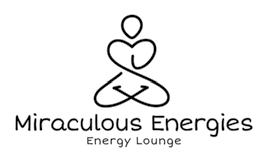
The EESystem combines Body, Mind, Spirit and Science. This system generates multiple bio-active life-enhancing energy fields, including scalar waves and a morphogenic energy field, also known as scalar vortex. When combined with light as biophotons, it can interface with the body's DNA matrix and promote wellness. See ad inside front cover.
MARKET & CAFE
305 N Clippert St, Lansing 517-332-6892 6235 W Saginaw Hwy, Lansing 517-323-9186
BetterHealthMarket.com

Michigan's #1 source for organic foods, vitamins and more. Better nutrition at better prices, all backed by better advice from our nutrition experts. You will find; organic produce, all the top-quality vitamins and supplement brands, sports nutrition and proteins, delicious prepared foods, desserts, an organic salads, soup and hot bar, natural bath, body and aromatherapy products, green home products. Get rewards through our APP. See ad page 21.
CASTLE REMEDIES
2345 S. Huron Pkwy, Ann Arbor In the Parkway Center 734-973-8990
CastleRemedies.com

Serving Michigan for nearly 40 years. Castle Remedies offers over 1,000 homeopathic remedies as well as herbs, essential oils, flower essences, books, unique gifts and jewelry. We carry top-tier nuitional supplement brands such as Metagenics, Ortho Molecular, Xymogen, Integrative Therapeutics, Karuna, NOW, and more. Classes available online. See ad page 15.
MOLDPRO
John Du Bois, CMI, CMR 247 W. Main Street, Milan 734-439-8800 • MoldProllc.com

MoldPro offers chemical-free mold remediatio, independent certified mold testing, inspection and consultation services all over SE Michigan specializing in mold biotoxin illness clients.
MICHIGAN FRIENDS CENTER AT FRIENDS LAKE COMMUNITY 7748 Clark Lake Road, Chelsea 734-475-1892
MFCenter.org/rent

We offer the holistic community a nature-oriented meeting space for workshops, meetings, counseling, yoga, youth groups and family gatherings. Main room accommodates 100 pre-COVID-19, with two smaller classrooms and kitchen facilities. Hiking trails. Weekend rates range from $200-$400, additional for extensive grounds use, camping. See ad page 17.
FREE AT LAST! HYPNOSIS CENTER - A JOYFUL JOURNEY
734-883-8775

Stop smoking in one visit. Afraid it’s going to be too painful or too difficult? Our unique specialized and proven system makes it easy. Become a happy and permanent non-smoker today. See ad page 25.
FREE AT LAST! HYPNOSIS CENTER - A JOYFUL JOURNEY
734-883-8775

Lose weight now with hypnosis. Achieve permanent positive life and habit changes through our safe, rapid and effective system. Tap the potential of your mind to create the health and vitality you’ve always wanted. See ad page 25.
WYCOFF WELLNESS
John O. Wycoff, DO 1226 E Michigan Ave, East Lansing 517-333-7270
WycoffWellness.com

We provide customized preventative care and lifestyle improvement plans for all patients. We focus on exploring natural solutions to many health problems or concerns, but do not abandon conventional medicine. We provide a blend of traditional and alternative care to help you achieve health and wellness naturally. See ad on back cover.
COMPASSION 4 PAWS
VETERINARY HEALING CENTER
517-412-7171
10444 W Grand River Hwy, Grand Ledge Compassion4PawsHealing.com

Offering primary veterinary medicine and urgent care for the routine and urgent needs of your pets! Primary care includes wellness visits for all life stages of your pet. We offer vaccines, preventatives and yearly parasite screening. We help make sure your pet stays healthy with nutritional consultation and assessments. See ad page 27.

If You Are Reading This, So Are Your



